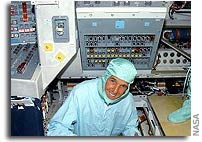John Kerry and John Edwards on Space and Aeronautics for the 21st Century

Americans are justifiably proud of this nation’s past aeronautics and space accomplishments. John Kerry and John Edwards believe that maintaining and increasing America’s leadership in aerospace is more important now than ever. NASA research has led to breakthroughs in a number of fields, far beyond space flight, aeronautics, or the other NASA missions. From breast cancer diagnosis technologies to wildfire management, from computerized design processes to cleaner cars, NASA research provides this nation with broad public benefits. The Kerry-Edwards administration will focus NASA on those areas of aeronautics and space research where the greatest public benefit can be realized.
Unfortunately, the Bush administration has undermined America’s efforts to move forward on space and the next generation of innovative ideas. The record budget deficits created by the Bush administration over the past four years will short change NASA and other research funding. The Bush administration’s push for the Moon/Mars mission is designed as a purely political stunt, without being backed up by the necessary funding. If we went forward with the Bush agenda, other NASA programs would be gutted. The Bush administration has also failed to work well enough with nations around the world to make space exploration a truly global endeavor.
John Kerry and John Edwards have a plan to pay for a strong, stable, and balanced U.S. aeronautics and space program, one that will continue to deliver major benefits to society, inspire interest in science, and help ensure American leadership in the world. Here are the five parts of their plan:
(1) Increasing funding for NASA to carry on the next generation of missions. The Kerry-Edwards plan devotes $30 billion to increasing research, innovation and entrepreneurship over the next decade – including increasing funding for NASA above current levels adjusted for inflation. This plan is fully paid for by accelerating the transition to digital television and auctioning off the spectrum that is freed up, ensuring that it will not add to the deficit.
In contrast, George Bush is jeopardizing the future of NASA with budget deficits that threaten future spending. Although he has outlined ambitious space goals, his budget does not include any money to meet these goals.
(2) Pursuing a more balanced space and aeronautics program that assigns appropriate priority to all NASA programs. The Bush administration’s plan for lunar bases and human exploration of Mars is based on political rhetoric rather than technical and fiscal reality. It was developed in secret, without consulting the U.S. scientific and engineering community or potential international partners. To finance this proposal, the White House suggests taking funds away from key space science, Earth science, and aeronautics programs.
The Kerry-Edwards administration will pursue a more balanced space and aeronautics program, one that assigns appropriate priority to all NASA programs. They will support solar system exploration as an important goal for our human and robotic programs, but only as one goal among several.
(3) Ensuring that space exploration is a global undertaking that unites all nations in the common quest for greater understanding. Yet the Bush administration is applying its unilateralist approach to the Moon and Mars as well as to this planet, and has excluded potential partners from its exploration planning. John Kerry will invite other countries to share in a meaningful way in both the adventure and the costs of space exploration.
(4) Putting an emphasis back on aeronautics R&D. Investing in aeronautics R&D is critical to maintaining the economic vitality and quality of life of our nation. In particular, we need to invest in the creation of a robust, safe, and secure air traffic management system that will be adequate to meet the growing demand for air travel that is predicted. Yet, it is hard to see how NASA will be able to play a credible role in that effort given the budgetary outlook for aeronautics implicit in the Administration’s exploration initiative. The Kerry-Edwards administration would reverse the decline in the priority given to aeronautics, and would set NASA on a course to reinvigorate its aeronautics research efforts.
(5) Improving the management of NASA. The current NASA top management was sent to the space agency by the White House specifically to fix NASA’s financial and management problems. But NASA has been unable to pass an independent audit of its books for two of the last three years, and the NASA Inspector General has cautioned that it is not likely to receive a clean audit for the current year either. The current failings of the agency’s financial management system are dramatized by the almost $2 billion discrepancy between NASA’s books for last year and those of the U.S. Treasury – this out of a $15 billion dollar NASA budget. Even the Bush administration’s own Office of Management and Budget rates NASA’s financial management performance “unsatisfactory.” The Kerry-Edwards administration will restore financial integrity and credibility to NASA.









